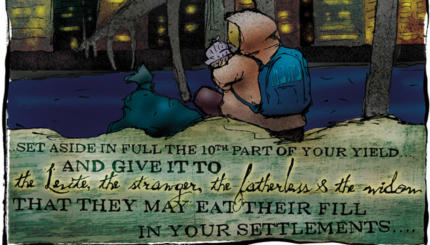The Jewish tradition is as hard-line as it gets when it comes to hametz. The Torah specifies nothing less than the punishment of karet, eternal spiritual excision, for anyone who consumes or even possesses leavened bread during the holiday of Passover.
But hang on, what’s so wrong with hametz?
An intriguing answer to this question is hinted at in the Torah text. Besides its appearance in the story of the Exodus, hametz is only referred to in one other context. We are told that in the mishkan, the Tabernacle that preceded the Temple, no leavened bread was allowed (Exodus 23:18; Levitus 2:11, 6:9-10). In the presence of God, hametz was prohibited. This suggests a fascinating possibility, namely that cleaning for Passover is so extensive because, once a year, we are supposed to turn our homes into temples.
On Seder night, we create the conditions for recognizing God’s presence by reenacting the scene of the paschal offering from the night of the Exodus. Now, as then, the action takes place in the family home. The actors are not priests or Levites but family members and friends. Now, as then, our homes become that focal point, the embodiment of the idea that God rests within each person. For a week we construct a world in which God dwells wholly within us, an ideal we strive to make real for the rest of the year.
In one of the most beautiful passages in the Torah, God tells Moses about the tabernacle the Israelites are commanded to build: “Ve’asu li mikdash veshakhanti betokham – They shall make Me a sanctuary and I will dwell in them” (Ex. 25:8). Strikingly, the text says that God will dwell ‘in them’ and not ‘in it’. Why use the plural form when sanctuary is written in the singular?
With your help, My Jewish Learning can provide endless opportunities for learning, connection and discovery.
The text says ‘in them’ because it recognizes that God dwells within each person, not just in one specific place. And it is this fact that most clearly demonstrates the immorality of slavery: Each person is a vehicle for God’s presence.
Therefore, when we remove hametz from our homes, we turn our home into a temporary tabernacle. By doing so, we remind ourselves that every person has the potential to become God’s true dwelling place in the world.
hametz
Pronounced: khah-METZ or KHUH-metz, Origin: Hebrew, bread or any food that has been leavened or contains a leavening agent. Hametz is prohibited on Passover.
Torah
Pronunced: TORE-uh, Origin: Hebrew, the Five Books of Moses.


